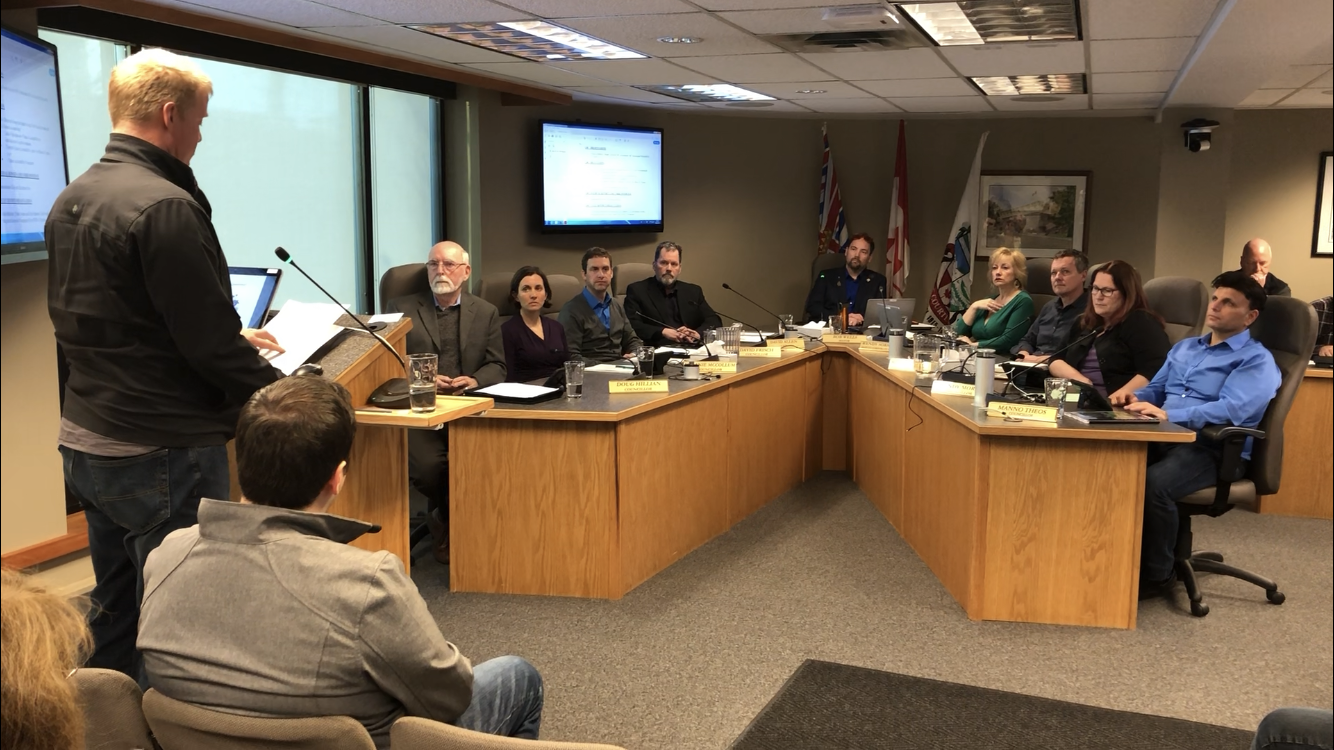COURTENAY, B.C- The question of whether or not Courtenay city council will ask fossil fuel companies to pay for climate costs won’t be decided immediately.
That’s according to Courtenay mayor Bob Wells, speaking to the MyComoxValleyNow.com newsroom after a presentation from the Dogwood Initiative, a non-profit based in British Columbia, which advocates for support for environmental causes.
The group sent a delegation to the council meeting on Monday evening, encouraging council to send a “climate accountability letter” to twenty of the world’s largest fossil fuel companies. They included a draft letter, addressed to Chevron, talking about Courtenay’s flood costs.
Andrew Gage, a lawyer with West Coast Environmental Law (WCEL), handled the bulk of the presentation.
Speaking to council, he indicated that changing climate conditions have already been impacting the area in the form of floods, droughts, and wildfires on Vancouver Island, which provided the reason for the city government to send a message to fossil fuel companies.
He also stressed that the city wasn’t being asked to file a lawsuit, though he did describe that as a “next step” and “tool” used to pressure companies.
The reception from council was fairly positive to the points that Gage was raising, though the question of actually sending a letter wasn’t addressed in detail.
Councillor David Frisch told Gage that it was a timely presentation, as council was still in the middle of setting their strategic priorities.
Councillor Doug Hillian brought up anti-Dogwood messages that came up during the recent municipal election, as well as the reception that Whistler received when they had sent a similar letter.
Gage told Hillian that the campaign was aimed at global fossil fuel companies, instead of Canadian ones, while stating that the contribution to climate change from Canadian fossil fuel companies was small in comparison to the global organizations.
Hillian also said that people didn’t seem to have urgency about climate change, indicating if it was the same urgency as wartime, the fossil fuel industry would be nationalized and their profits would be put towards renewable energy.
Councillor Manno Theos was more cautious, and concerned about the impact of the city taking court action.
“What you’re describing, in my opinion, could become a massive cost to municipalities and to the staff,” said Theos.
“Staff time is limited, we hear all the time, over and over again, and if we’re trying to address this matter, and go up against these companies in such an aggressive way, that could actually get to the point where you could bend the city’s capacity, both staff and financially.”
He compared it to court battles over the health impact of fast food.
“Those arguments didn’t go anywhere, because it was people’s choices to be consuming those foods, according to the courts,” said Theos.
“Unfortunately, municipalities and citizens have to lose through the healthcare system, because the healthcare system gets overwhelmed with a lot of these situations, dealing with that.”
He brought up India and China as countries causing climate issues more than Canada, and believed that education around the world on climate impacts from fossil fuel use would be more effective than trying to battle fossil fuel companies.
In response, Gage stated had put too much emphasis on litigation during his presentation, and raised other options, such as legislation from other levels of government and international agreements.
“All of this depends, all of these options depend on the public recognizing that there is a need to actually address this,” said Gage.
As for what direction the council will actually take, Wells indicated that the request would come back to them in roughly the next two months, depending on what councillors want to do and other matters that come to their attention.
“I’m going to be looking to our council, to see where their passion is,” said Wells.
“As a municipality, we certainly are getting the brunt of this, if we look at the Comox Valley, but I want to look at what the effectiveness is going to be, obviously we heard what happened to Whistler when they sent their letter, it impacted them negatively. I don’t know that we do things at the level that Whistler does, but (it’s) something to consider.”
He believed it would be worthwhile to ask residents of the city their thoughts on the sending of a letter, but indicated council would be the final decision maker.
Asked about the city possibly undertaking legal action, Wells raised the example of lawsuits against tobacco companies.
“The majority of the tobacco lawsuits are still under litigation,” said Wells.
“So it’s a long, protracted, expensive process, that’s not going to yield the results right away. If I was hearing them correctly tonight, it’s about raising that awareness and letting companies know that we’re going to be expecting them to look at alternatives.”






